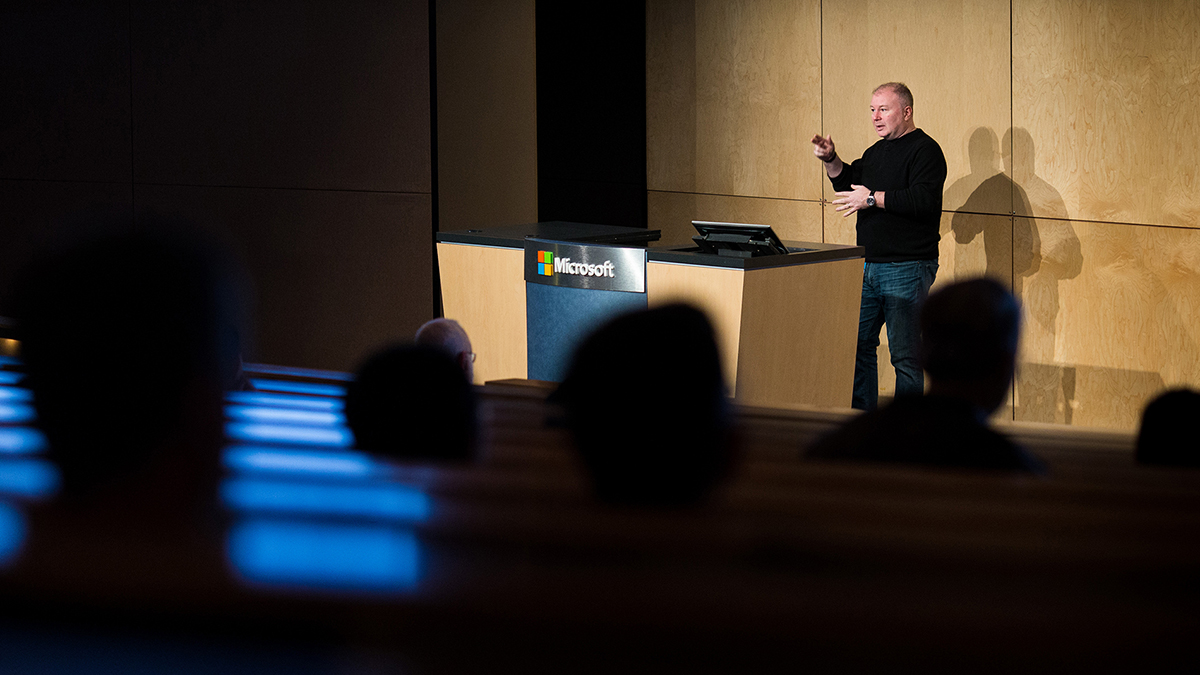As a software engineer at Microsoft, Elena Voyloshnikova’s job is to make informed recommendations about how to improve the performance of software engineering tools.
But too often, she spends her days manually analyzing the data she needs to make those decisions. Lately, her team has been discussing the potential of building machine learning models to automate that task – creating more time to focus on the decision-making.
That’s why she was intrigued when she received an email announcing an upcoming AI training session for Microsoft employees.
“I asked my manager, ‘Can I go to this?’” she said. “I thought it looked like a good overview of things I would like to know.”
Voyloshnikova was one of more than 1,200 employees who attended the session in person or via livestream – an audience size that reflects the desire even of people who work in technology companies to better understand AI.
To address that need, Microsoft routinely offers AI training sessions to its employees and is increasingly opening similar types of training to the public.
On Monday, the company announced the Microsoft Professional Program in AI, the latest learning track open to the public. The program provides job-ready skills and real-world experience to engineers and others who are looking to improve their skills in AI and data science through a series of online courses that feature hands-on labs and expert instructors.
The program is part of a larger corporate effort that also includes the enterprise developer-focused AI School, which provides online videos and other assets to help developers build AI skills. That program includes both general educational tools for developers looking to expand AI capabilities and specific guidance on how developers can use Microsoft’s tools and services.
For example, AI School covers how to use offerings such as Microsoft Cognitive Services, which allow developers to incorporate intelligent algorithms for computer vision, natural language processing and translation capabilities into their products, and the Azure Bot Service.

Microsoft’s employee and publicly available AI training opportunities reflect a broader push throughout the technology industry to fill a gap in workers with skills in artificial intelligence, according to Susan Dumais, distinguished scientist and assistant director of Microsoft Research AI.
“AI is increasingly important in how our products and services are designed and delivered and that is true for our customers as well,” she said.
“Fundamentally,” she added, “we are all interested in developing talent that is able to build, understand and design systems that have AI as a central component.”
AI training for all
Microsoft’s AI training efforts range from internal offerings tailored to employees on specific teams and product groups, such as software engineers at LinkedIn, to external ones designed for a variety of expertise levels.
For example, the Microsoft AI Residency Program and Microsoft NERD Artificial Intelligence Program recruit people to learn AI by working alongside researchers, designers and engineers who are developing AI capabilities and serve as a pipeline of talent into the company.
The Microsoft Professional Program in AI is an outgrowth of Microsoft’s internal AI training initiatives, including what was internally dubbed AI School 611, a project-based semester-style program that provides a competitively selected group of employees with tools, training and mentoring from leading experts in AI and machine learning to bring new AI capabilities into their product or service.
“We solicit, from all over Microsoft, projects that require AI which can be accelerated by working closely with AI experts to help shape new algorithms and data pipelines,” said Dumais, who leads the program.
Microsoft Professional Program in AI
The three-hour course that Voyloshnikova attended introduced her to the types of programs and applications that can be developed today using AI, such as interactive bots on websites that are trained to recognize vocabulary specific to the website’s audience.
Graeme Malcolm, senior content developer in Microsoft’s Worldwide Learning Group, who led the session, explained that the session is a condensed version of the introductory course in the Microsoft Professional Program in AI, which allows enrollees to dive in and build a deeper set of AI skills.
For example, the learning track teaches students how to work with data to build and train machine learning models that power interactive bots.
The learning track in AI consists of nine skills, which each take between eight and 16 hours to complete, and cover topics such as how to use the programming language Python to work with data, the ethics of AI and how to build various types of machine learning models.
Enrollees gain real-world experience through lab work and a capstone project to demonstrate the skills learned. Everyone who successfully makes it through the learning track receives a digital certificate to put on their resume.
“The Microsoft Professional Program is designed to teach you new job skills,” Malcolm said. “We have worked with industry to identify areas where there’s a skills gap that we need to fill.”

Career growth
The Microsoft Professional Program in AI is one of several online certification programs available from the Worldwide Learning Group, including a closely related program in data science.
“We are starting to package those together to create a curated learning path,” said Malcolm. “We think of it in terms of what we call committed learners, someone who says this is going to take me six to nine months to cover all of the ground and commits some time to hopefully move forward in their career.”
The online, on-demand courses from Microsoft reflect a broader shift in computer science education toward so called massive open online courses, or MOOCs, that help keep workforces current with the latest technologies and open a pathway for career advancement.
Microsoft’s offerings bring “our knowledge of the job market and what new real-world skills are required,” said Malcolm.
Voyloshnikova signed up for a preview of the Microsoft Professional Program in AI available to employees and is working her way through it, mostly on weekends. “It seems really important to do it,” she said.
The software engineer hopes to apply her new skills in machine learning to build and train models that automate the data analysis steps required to make informed recommendations about system optimizations needed to make software engineering tools more efficient.
“I would like to grow within Microsoft,” she said. “So, it was really nice to see that Microsoft is doing this. It means that Microsoft is not just focused on ‘We have to get this feature out and this feature out;’ it is more like, ‘We need to let the company grow.’”
Microsoft AI School – Related links:
- Read about the AI Business School
- Check out the Microsoft Professional Program in AI
- Learn more about AI at Microsoft
- Learn more about the Microsoft Professional Programs in Artificial Intelligence and Entry Level Software Development
- Check out the Microsoft AI Residency Program and Microsoft NERD Artificial Intelligence Program
- Learn more about AI School
John Roach writes about Microsoft research and innovation. Follow him on Twitter.





